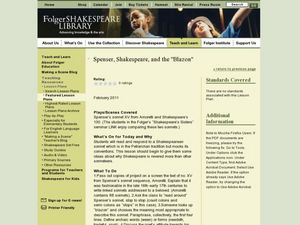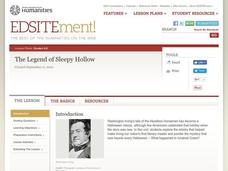Curated OER
Sleuthing A Writer's Skills
Students read The Train Ride Home by Robin Solomon. For this literature response lesson, students will inspect the writing of Solomon to determine how she established a certain tone through her word choice and paragraph structure....
Curated OER
The Raven
After a close reading of Edgar Allan Poe's "The Raven" individuals copy the rhythm and rhyme scheme and rewrite the final stanzas of the poem.
Curated OER
Training Students for Literature Circles
Role sheets clearly define expectations of all group members in this introduction to literature circles. By using a variety of picture books or short texts, readers can practice roles while the teacher circulates to each group observing...
EngageNY
Grade 9 ELA Module 1, Unit 2, Lesson 3
How do writers develop a central idea in a text? How can readers identify this central idea? These are the challenges class members tackle as they continue their analysis of "Letter One" from Rainer Maria Rilke's Letters to a Young Poet.
National Endowment for the Humanities
Walt Whitman to Langston Hughes: Poems for a Democracy
Explore the idea of democratic poetry. Upper graders read Walt Whitman, examining daguerreotypes, and compare Whitman to Langston Hughes. They describe aspects of Whitman's I Hear America Singing to Langston Hughes' Let America Be...
EngageNY
Grade 9 ELA Module 1, Unit 1, Lesson 15
How much progress has Claudette made at the end of "St. Lucy's Home for Girls Raised by Wolves"? Ninth graders note evidence for and against Claudette's successful adaptation into human society with a graphic organizer. Additionally,...
Maryland Department of Education
The Concept of Identity Lesson 2: The Historical/Biographical Approach
"How does our environment shape our identity?" After researching biographical information about John Knowles and considering how these experiences are reflected in A Separate Peace, class members consider the strengths and weaknesses of...
EngageNY
Author’s Craft: Poetry and Prose
During a drama circle, scholars closely examine the play created in the play A Midsummer Night's Dream. The pupils read Act 3 Scene 1 and turn and talk to their partners about the scene. They then complete a handout and discuss the...
Curated OER
Spenser, Shakespeare, and the "Blazon": Lesson 4
Students discuss the meaning and tone of Shakespeare's Sonnet 130. In this sonnets lesson, students compare Spenser's sonnets to Shakespeare's. Students discuss specific words that add to the humor in Shakespeare's sonnet, paying close...
Roy Rosenzweig Center for History and New Media
Analyzing Political Campaign Commercials
Imagine a activity that models for learners how to separate facts from opinions. How to detect bias. How to evaluate a source of information. How to identify propaganda. Although designed for middle schoolers, the activities in this...
Curated OER
Reading Poems Aloud: Sound And Meaning
Students consider the elements involved in reading poetry aloud. They discuss different poetic forms and how the choices a reader makes in tone, emphasis, breaths, and pauses can affect the listener's interpretation and understanding of...
National Endowment for the Humanities
García Márquez’s Nobel Prize Speech: “The Solitude of Latin America”
To conclude a study of One Hundred Years of Solitude, class members analyze Gabriel Garcia Marquez's Nobel Prize in Literature acceptance speech. After a whole-class discussion of the main ideas in the speech, individuals draft a...
Read Works
The Tone of a Poem
Tone and poetry are closely tied. Show your class how to determine the tone of a poem by noting your reactions and marking lines that bring out feelings. Next, work as a class to work through a second poem. Finally, have individuals read...
Curated OER
The Rest Cure: Gender in Medicine and Literature
Read and discuss "The Yellow Wall-Paper" and the gender issues that the story brings up. Use articles from the time period to analyze, complete with specific discussion questions. After two days, scholars write an essay based on topics...
Curated OER
"You're Probably Tired, Dear Diary" - Children's Diaries during the Holocaust
As part of the study of WWII and the Holocaust, class members read a series of diary entries written by children during the onslaught of Nazi occupation. Each entry is accompanied by biographical information and discussion questions. The...
Curated OER
That Was Then - Persuasive Essay
Student explain how geographic and cultural settings influence a person's identity. They compare and contrasting Esmeralda Santiago's Puerto Rican self with her American self by participating in a close reading of the text and writing a...
Curated OER
How to Move the Crowd: The Persuasive, Powerful Rhetoric of Mark Antony -Folger Shakespeare Library
Tenth graders explore a close reading of the speeches of Brutus and Mark Anthony in 3.2. They identify the effects of the rhetorical appeals used. Students explore the variety of ways in which Anthony might have delivered the speech....
Virginia Department of Education
Identifying Audience and Purpose
Use a fun and creative activity to introduce junior high learners to how writing changes for different audiences and purposes. The activity begins with a reading by the instructor where teens visualize a food fight in the cafeteria. In...
Illinois Mathematics and Science Academy
A Search for Symbolism in The Great Gatsby
After reading The Great Gatsby, groups return to the text and note passages where Fitzgerald uses symbols and color imagery in his narrative. They then develop a presentation that explains the context, the implications, and possible...
Curated OER
The Legend of Sleepy Hollow
Explore Washington Irving's "The Legend of Sleepy Hollow" in this literature analysis instructional activity. Middle schoolers read and summarize the plot of the story. They then adapt passages for a contemporary audience and analyze the...
Curated OER
The Bill of Rights: Debating the Amendments
Provide your class with an opportunity to investigate an important historical document. Without identifying the document, distribute copies of the original Bill of Rights, as transcribed by John Beckley, Clerk of the House of...
Curated OER
Dialogue Disguises
Learners read a story out loud to a partner and change their voices and expressions when depicting specific characters. In this language arts lesson plan, students focus on the person's voice who is reading to them, while keeping track...
Curated OER
Inside Hamlet
Learners examine how tone and inflection shape the character of Hamlet. In this Shakespeare lesson, students summarize what they know of Hamlet and complete a read around. Learners discuss the inflection patterns and tone in the reading...
Curated OER
Crafting Poetry: A Sensory Journey
Tenth graders experiment with poetry devices to write poems. In this poetry lesson, 10th graders participate in learning stations. Students create a word pool and select a word from the list to create a line of poetry. Students complete...

























